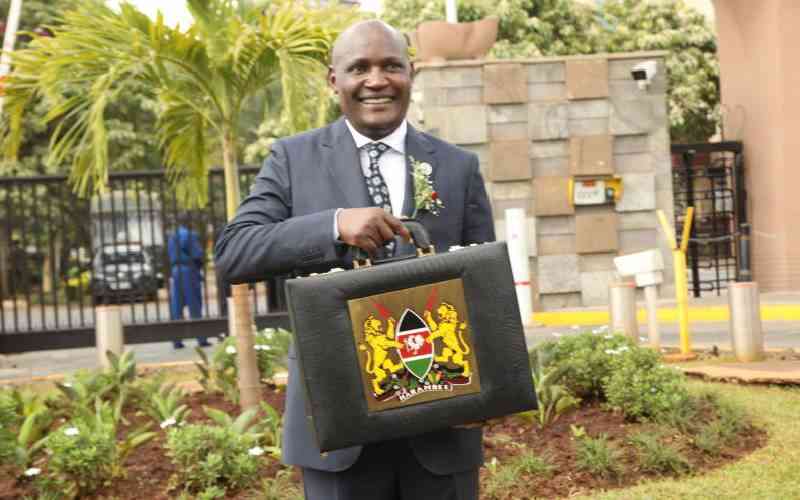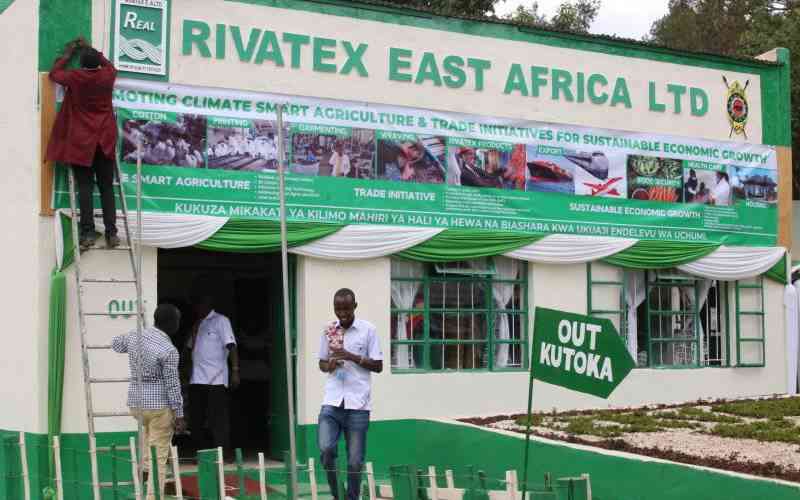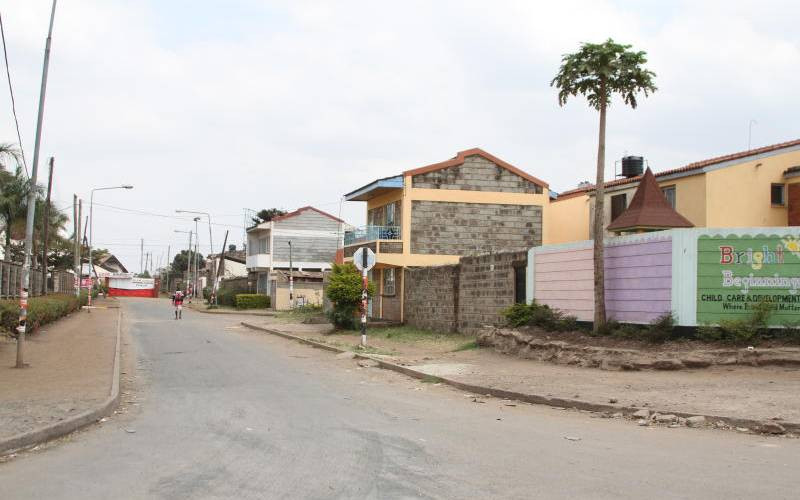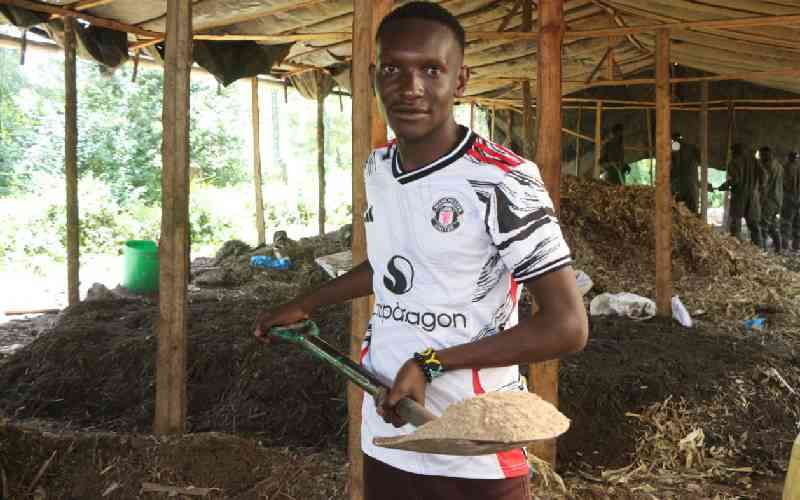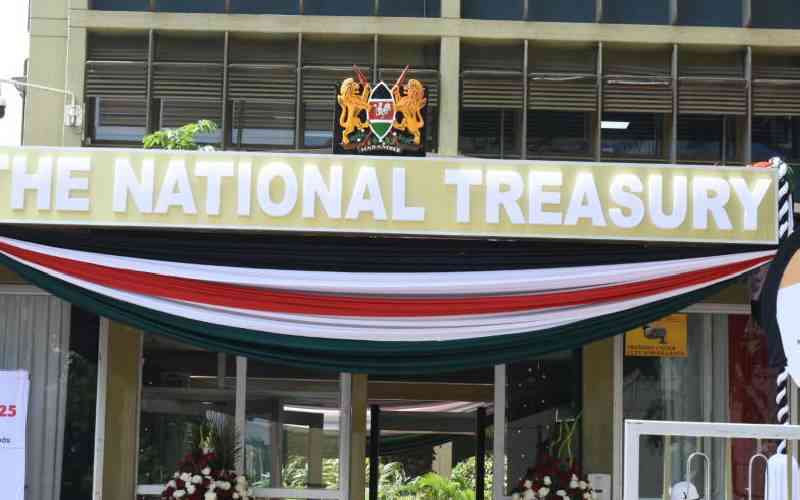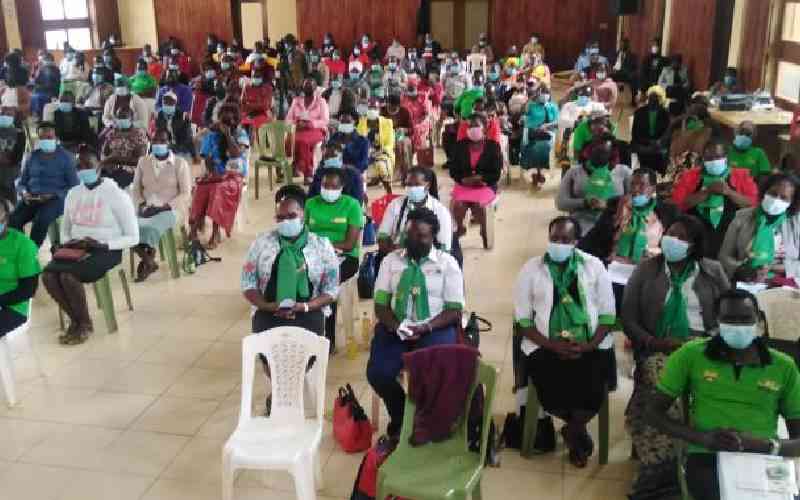
Women from various wards in Uasin Gishu County during a consultative forum before receiving cheques from Women Enterprises Fund in Eldoret. [File, Standard]
In February 1994, Lucy Mbugua started a small business preparing and selling fermented porridge to various customers. She invested Sh250, used to buy cassava, maize and sorghum, which she mixed and ground into flour.
Dubbed uji power, the fermented and nutritious porridge quickly became popular. Lucy initially sold it within Kiambu township, and as demand grew, she expanded her sales to other areas that hosted gatherings or sports activities.
As more people enjoyed her fermented porridge, Lucy decided to raise additional funds to invest in her rapidly growing business. She joined other women in a table banking group, allowing them to borrow money and invest in various businesses.
The group, named Design Women Group, began practising table banking, where members contributed money that was then given to one member at a time.
“My turn to receive the funds coincided with the opening of school. I used the money to pay school fees for my three children, leaving me with nothing to invest,” she recalls.
In 2013, the group was introduced to the Women Enterprise Fund (WEF). After receiving training, they obtained a loan of Sh100,000, which was divided among the 17 members to invest in their individual businesses.
Lucy says the loan made a huge difference in the group. The fact that it was interest-free made it easier to repay.
The group continued practising table banking, allowing members to borrow funds, invest, and repay with interest. The interest earned remained in the group’s account, strengthening their internal fund base.
Since then, Lucy and her group have taken additional loans of Sh200,000, Sh350,000 in 2019, followed by Sh500,000, and most recently Sh750,000 early this year, which they are currently servicing.
Over the years, Lucy has steadily grown and expanded her enterprise, which is now worth tens of thousands of shillings. Through her hard work, she has made substantial profits and successfully educated her four children up to university level.
“Access to finance through WEF has transformed our livelihoods. Our members have built rental houses, bought land, and diversified into shops, farming, and cereal aggregation. This has enabled women to expand their businesses and achieve financial independence,” she explains.
Lucy shared her story during the 5th National Agribusiness Summit at the Kenyatta International Convention Centre (KICC) in Nairobi. It was themed ‘From Promise to Action: Advancing Agribusiness through Dialogue and Innovation.’
The summit, organised by Agriculture Sector Network (ASNET), brought together national government leaders, private sector players, development partners, academia and farmer organisations to discuss actionable pathways for transforming Kenya’s agriculture into a competitive, inclusive and sustainable agribusiness sector.
Stay informed. Subscribe to our newsletter
ASNET Chairman Dr Bimal Kantaria says for years, the focus was primarily on agriculture, but this year, there’s been a shift. This year, he says the focus has slightly changed to how to empower agribusinesses to grow, create jobs and contribute more in taxes.
“As you know, we have a growing youth population, many of whom are seeking opportunities to engage in agriculture across the value chain, whether in production, marketing, transportation or promoting agriculture globally through technology,” he said.
The online self-help group, based in Dandora, has also benefited from WEF. Peris Mumbi, a member of the group, says they formed the group about 15 years ago, initially engaging in table banking activities.
Over time, they were introduced to the fund, through which they received their first loan of Sh100,000 in 2019. “After receiving the funds, we channelled them into our table banking system, allowing members to borrow and invest in their own businesses,” Mumbi explains.
After successfully repaying their first loan, the group applied for a second loan of Sh250,000 two years later. Currently, they are servicing a Sh350,000 loan taken last year.
With the support of these loans, Mumbi says the group has expanded into sisal value addition, producing items such as kiondos and other handmade baskets.
She recalls that, before partnering with the WEF, they faced challenges due to limited access to capital, which made it difficult to grow their businesses.
At one point, the group considered taking loans from commercial banks, but was discouraged by the high interest rates. Today, apart from sisal value addition, the group also has members who invested in retail shops and general trading.
“The WEF has been instrumental not only in providing affordable credit but also in helping members access markets and participate in exhibitions across the country. We now have a stable local market and are looking forward to expanding our reach to neighbouring countries and eventually beyond,” Peris notes.
Deputy Director, Marketing, Communication and Research at the Women Enterprise Fund (WEF) Everlyne Lusweti says the fund continues to transform the lives of Kenyan women through affordable credit, financial literacy and capacity-building initiatives that empower them to grow sustainable businesses and improve their livelihoods.
Since its inception in 2007, WEF has disbursed over Sh28 billion to women’s groups across all 290 constituencies in Kenya, benefiting more than 2.25 million women to date.
“Women across the country have received loans and participated in capacity building and applied the knowledge gained to enhance the quality and value of their products,” she explains.
She notes, the fund’s loans and training programmes have helped women improve their ventures in agribusiness and crafts, from turning sisal into kiondos, drying bananas to make matoke, to processing vegetables such as moringa and managu for off-season use.
She explains, while the loans are interest-free, beneficiaries pay a six per cent administrative fee, which is charged upfront at the time of disbursement.
“Most beneficiaries begin with a loan of Sh100,000. Once they successfully repay, they can apply for a higher amount of Sh 200,000, then Sh350,000, Sh500,000 and up to a maximum of Sh750,000,” Lusweti explains.
“The repayment period ranges from six months for the initial loan to 18 months for the highest level.”
Lusweti says about 60 per cent of the loans support women engaged in agriculture, including crop farming, poultry and livestock enterprises.
The fund primarily lends to registered women’s groups comprising 10 to 30 members. Each group must be registered under the Ministry of Social Protection and complete a three-day financial literacy training before receiving funding.
Once trained, Lusweti explains, members can apply for an initial group loan of Sh100,000. The group then decides whether to invest in a joint project or support members in individual ventures.
This model has proven remarkably successful, with a repayment rate of 95 per cent.
She adds that the financial literacy training covers essential topics such as bookkeeping, profit and loss management, and record keeping, skills that help women not only manage their loans effectively but also build sustainable, long-term businesses.
Tabitha Nyakio, a member of the Moringa Women Group based in Ruiru, says the group has faced financial challenges since its formation in 1997, starting with a small merry-go-round of just five women.
The group’s initial activities focused on rotating savings and contributions for the personal use of its members.
It was a significant boost when, in 2013, the group was linked to WEF and received its first loan of Sh100,000, which members invested individually. “We took out the loan after officials from WEF visited and trained the group on investment, financial management and agribusiness,” Tabitha says.
After repaying the initial loan, the group qualified for larger loans, of Sh200,000 and, most recently, Sh500,000 in 2024.
“These progressive loans have allowed our members to scale up from small savings to productive investments in moringa farming and processing,” noted Nyakio.
She explains, they were also trained on how to add value to their moringa produce, including drying the leaves and selling the products locally. This value addition has created a steady income stream for the members.
Nyakio says she earns about Sh20,000 per month, which has improved her livelihood. “Our group also engages in community service, donating moringa products to elders due to its nutritional benefits,” she explains.
However, their main challenge is drying the moringa leaves. They lack a proper drying facility and cannot dry the leaves directly in the sun, as this affects the product’s quality.
“Currently, we dry moringa leaves in the shade inside our houses, but the process is very slow. Our target is to get a modern drying equipment to improve both efficiency and product quality,” she concludes.
Lusweti says there is still a need for greater awareness and marketing to ensure more women learn about and take advantage of the opportunities offered by the fund.
She says favourable loan terms provide a valuable platform for women to grow and sustain their businesses.
